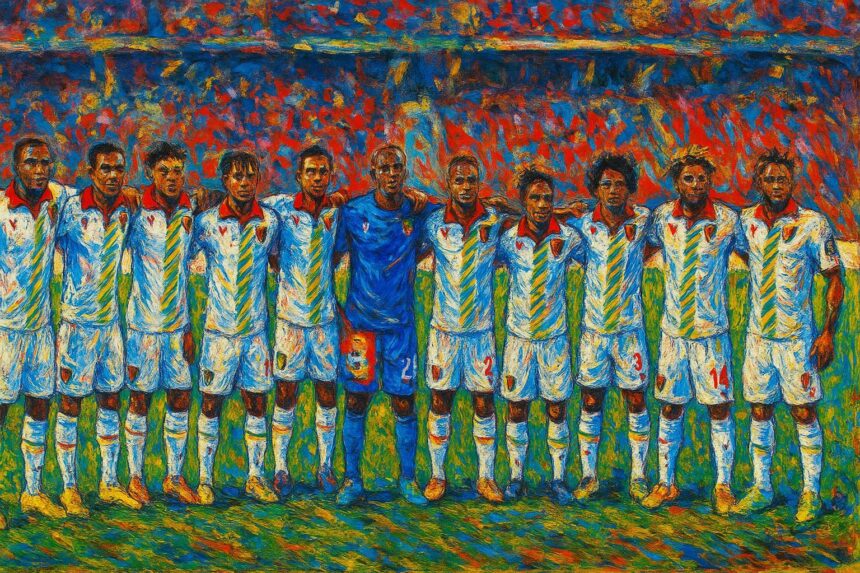Continental stage and diplomatic undertones
Beyond the immediate drama of ninety minutes, the African Nations Championship has evolved into a discreet arena of soft power, allowing governments to showcase administrative efficiency, cultural vibrancy and, crucially, the depth of their domestic leagues. By jointly allocating the 2025 edition to Kenya, Uganda and Tanzania, the Confederation of African Football signalled a desire to spread sporting capital across the East African seaboard (CAF communiqué, 15 May 2024). For Brazzaville, participation is therefore more than a sporting errand; it constitutes a projection of national identity under President Denis Sassou Nguesso’s policy of regional engagement, articulated most recently at the Summit of the Three Basins in October 2023.
Squad preparation under constrained timetable
The Diables-Rouges arrived in Zanzibar with limited collective mileage. Domestic competitions were paused for administrative audits earlier in the year, a circumstance publicly acknowledged by Sports Minister Hugues Ngouélondélé, who nevertheless emphasised that the pause was “designed to secure long-term sustainability of our clubs” (Ministry press briefing, 12 June 2025). The consequence was a six-month stretch without competitive fixtures for many selected players. Attempts to schedule friendlies against Gabon and Central African Republic reportedly collapsed over logistical overlaps with CAF Champions League qualifiers. In view of that context, technical director Barthélémy Ngatsono opted for continuity, fielding nine starters who had featured at the 2022 COSAFA Cup.
Tactical narrative of the Sudan encounter
Match statistics paint a balanced contest—46 percent possession for Congo versus 54 percent for Sudan—but the temporal sequence revealed contrasting phases of control. Musa Ali Hussein’s 29th-minute strike, a curling effort from the edge of the area, rewarded Sudan’s early vertical pressing. Congo’s midfield double pivot of Mignon Bissadidi and Prince Obongo struggled initially to exit pressure, completing only 68 percent of their forward passes before the interval. The second half, however, bore witness to an adjustment that hinted at Ngatsono’s situational acumen. Introducing the lanky forward Carly Ekongo in a hybrid left-inside role created overloads on Sudan’s right channel. Ekongo’s equaliser at minute 86—drilled low past goalkeeper Ali Abdallah—was emblematic of that shift. A further strike, bundled over the line in stoppage time, was chalked off for an earlier touch judged to have left the field. Television angles remain inconclusive, yet VAR is not deployed at CHAN, leaving the referee’s assistant as final arbiter.
Political optics of a measured comeback
In diplomatic circles, the ability to engineer a late recovery is often framed as evidence of institutional resilience. Observers close to the Congolese Football Federation noted that players celebrated by gathering around the national flag rather than individual goal-scorers, a gesture that dovetails with Brazzaville’s official narrative of cohesion. State broadcaster Télé Congo carried the match live, and commentary emphasised the “moral fibre” of local talent nurtured under the government’s «Plan National de Développement du Sport». That rhetorical framing avoids assigning blame for the earlier sluggishness, instead underscoring the squad’s capacity to internalise corrective instructions—an attribute widely prized in diplomatic assessments of governance.
Statistical context within Group D
With Senegal defeating Nigeria 1-0 in Kisumu on the same day, Group D assumes the contours of a three-way chessboard. Congo’s single point places it level with Nigeria yet within touching distance of the holders. The format stipulates that only the top two sides advance, rendering goal difference a potential tie-breaker. Historically, the Diables-Rouges have progressed from the group stage once—in Rwanda 2016—where they topped a section that also included Ethiopia and Nigeria (CAF archives, 2017). The present squad must match that feat while contending with the most recent continental champions in their next fixture.
Strategic horizons before the Senegal clash
Technical staff have scheduled closed-door recovery sessions at the Amaan Stadium annex, followed by a charter to Kampala for acclimatisation to the altitude conditions expected in Kisumu. Analysts inside the Francophonie Institute for Sport anticipate Senegal to employ a high defensive line, inviting Congo’s pace through channels. Ekongo, therefore, may start rather than reprise his impact-sub role. While the Congolese bench carries only two natural wide men, Ngatsono hinted in post-match remarks that centre-forward Axel Ndzana could be redeployed as an inverted winger, an experiment trialled briefly during domestic league play last December. Diplomatic missions in Nairobi meanwhile confirm that supporters will receive facilitated visa procedures, underscoring regional goodwill.
Broader significance for Congolese football
A credible run in the CHAN would dovetail with the government’s ambition to leverage sport as a vector of youth employment and continental visibility. The Ministry of Foreign Affairs, in its 2024 white paper on cultural diplomacy, cited football’s “unique convening power” in advancing the objectives of the Strategic Plan Congo 2030. In that light, the Zanzibar draw is interpreted not solely as a sporting result but as a reaffirmation of a national programme that prizes perseverance under pressure. The road to the quarter-finals remains arduous; yet, as international observers noted in the corridors of the African Union headquarters last week, momentum in diplomacy—much like in football—often turns on a single, well-timed equaliser.




















